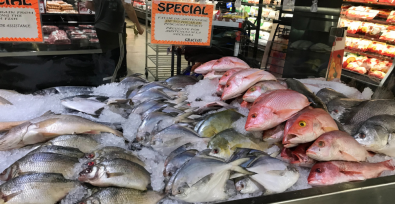A documentary film crew recently investigated modern slavery and human rights abuses reported onboard Chinese fishing vessels. According to The Irish News, the team traced the seafood supply chain caught by Chinese vessels and processing plants where abuse and forced labor had been reported to prominent grocery store chains across Ireland and Europe.
Seafood that comes with a list of abuses
The Outlaw Ocean Project, led by Ian Urbina, a former New York Times investigative reporter, spent four years tracking, documenting, and mapping the supply chain of Chinese fishing vessels. They interviewed deckhands and workers about their treatment onboard the vessels as part of the investigation.
A deckhand they spoke to said:
“Our passports were taken; they won’t give them back. I don’t know how to get back, they won’t let me off this boat. They force us to stay here, and we can’t leave, even if we want nothing from them.”
In addition to confiscating passports and denying requests to leave, workers reported deaths from violence, debt bondage, withheld wages, excessive working hours, beatings, and restricted medical care. Worker’s testimonies were gathered using interviews conducted in person and via radio and messages exchanged in plastic bottles across ships as often workers were not allowed to talk to the investigators directly.
From ship to shore, seafood supply chain is contaminated by forced labor
The investigation used drones and satellite images to painstakingly map the journey of seafood from vessels where abuse was reported to the shelves in shops all over Ireland. Brands like Tesco, Lidl, and Aldi were found to sell seafood products tainted by labor abuse both on the ships and during processing at Chinese plants.
Investigators claim:
“Over 100 people from the Xinjiang region in China were transferred to work at (processing) facilities…through a “poverty alleviation” scheme, a common euphemism for a forced labor program.”
The investigation points to several European white fish importers who are importing fish from Chinese processing plants known to use Uyghur forced labor. In 2022, Nomad Foods, a European seafood supplier giant, turned over $3bn worth of imported fish. They also own several household brands, such as Bird’s Eye, Findus, and Iglo. Their products are found not just in Ireland but also in the UK, Italy, Germany, France, and Sweden.
Sadly, the issue of modern slavery at sea is not isolated to Chinese fishing vessels. Based on numerous studies reported by Human Rights at Sea, it is criminally common to find large numbers of men held against their will on fishing boats in countries all over the world. On these boats, just as on the Chinese fishing vessels, they endure torturous working conditions with little or no opportunity to escape. Read more about slavery at sea, and the work Freedom United has done to try and stop it here.
Take action and stand with us against Uyghur forced labor.







Freedom United is interested in hearing from our community and welcomes relevant, informed comments, advice, and insights that advance the conversation around our campaigns and advocacy. We value inclusivity and respect within our community. To be approved, your comments should be civil.
Our family will no longer buy brands owned by Nomad Foods , unless they demonstrate that they have stopped buying from Chinese processing plants that are involved in this appalling mistreatment of workers.